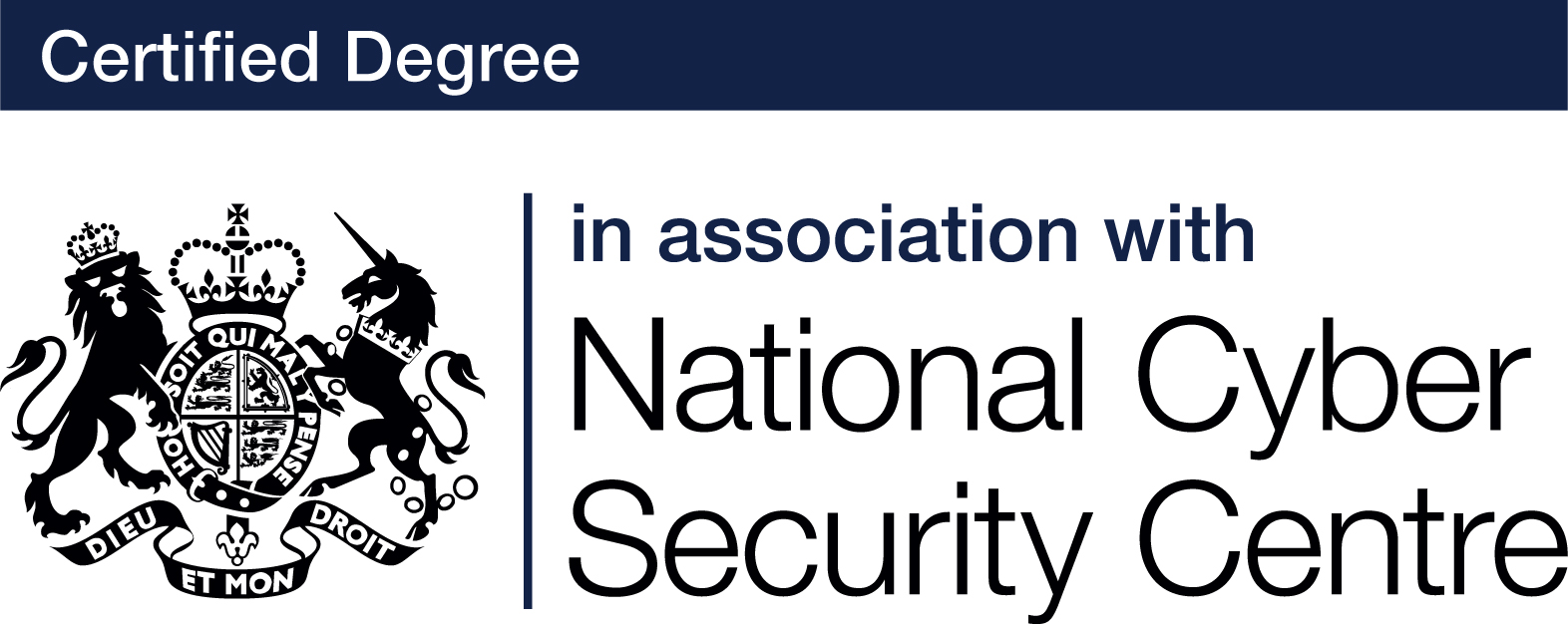Cyber security-related modules
Different non-Computing schools of the University of Kent also offer individual modules related to cyber security.
Kent Law School
LAWS6410: Privacy, Data Protection and Cybersecurity Law (Level 6)
This module will focus on the way in which the law defines and constructs privacy, breach of confidence, cybersecurity threats, and e-surveillance in the UK, EU and elsewhere as appropriate (e.g. North America, Australia) and how the law regulates data protection, freedom of information, consent for digital and personal information collection, use and sharing, and e-surveillance.
LAWS6610: Advances Topics in Data Protection and Cyber Law (Level 6)
This module builds on the understanding developed in LAWS6410 ‘Privacy, Data Protection and Cybersecurity Law’, which introduces students to the key concepts and issues in the regulatory framework governing including privacy, data protection, and developments in cyber-crime and cyber security.
LAWS6600: The Regulation of Surveillance/Platform Capitalism (Level 6)
Surveillance Platform Capitalism (SPC) is the use of highly sophisticated algorithms and artificial intelligence to “mine” or extract commercial value from personal data and information about the behaviour of consumers online. The aim of the module is to examine SPC through a socio-legal lens and to provide students with key concepts and interdisciplinary insights to understand and reflect critically on the on the nature and effects of SPC on individuals and society.
LAWS9210: Privacy and Data Protection Law (Level 7)
The module will explore emerging privacy and data protection issues. Students will be challenged to critically examine how e.g. personal, financial, health and transactional data are managed and who has access to this information. It will require students to assess emerging legal, regulatory, data protection and personal privacy issues raised by widespread access to personal information, including genetic data.
School of Politics and International Relations
POLI6910: Governance and War in Cyberspace (Level 6)
This module provides an overview of the degree to which cyberspace continues to revolutionise the operations of both state and non-state actors, and the challenges of governing this ‘fifth sphere’ of power projection. Key themes include: 21st century technology, cyber warfare, espionage, surveillance, deterrence theory, cyberterrorism, and representation of threatening cyber-entities.
POLI8114: Governance and War in Cyberspace (Level 7)
This module provides an overview of the degree to which cyberspace continues to revolutionise the operations of both state and non-state actors, and the challenges of governing this ‘fifth sphere’ of power projection. Key themes include: 21st century technology, cyber warfare, espionage, surveillance, deterrence theory, cyberterrorism, and representation of threatening cyber-entities.
POLI9160: Security in a Changing World (Level 7)
This module focuses on the evolution of security studies as a discipline and its implications for practice. We examine a variety of theoretical and empirical materials that provide students with the basis for analysing pressing questions related to issues of war, security and peace in the world today.
School of Social Policy, Sociology and Social Research (SSPSSR)
SOCI7600: Technology, Control and Cyber Crime (Level 6)
This module provides students with an understanding of contemporary cybercrime, its implications and its sociological meanings. It examines how cybercrime functions, how it relates to wider criminological debates and theories, and how it raises challenges in our understanding of the nature of crime, criminality, crime control and policing.
SOCI9270 Definitions, Prevalence, Causes and Consequences of Child Abuse and Neglect (Level 7)
This module will provide students with a historical and contemporary perspective of child abuse and examine child and family centred practice, and will allow students to explore definitions of abuse, nationally and internationally. A significant area of research will be drawn upon with regards to the role of men in child protection. The module will also introduce key agencies in the field. The child protection simulations created by the Centre for Child Protection around child sexual exploitation (Looking for Lottie) and radicalization (ZAK), are embedded in this module.
SOCI9280 Contemporary Child Protection Practice and Policies (Level 7)
The aim of this module is to focus on contemporary child protection policies and practice and provide the current legal context for child protection. In particular it will discuss policy and practice following the Munro Review (2011) and it will draw upon the implications of inter-professional and interdisciplinary research, theory and practice pre- and post- Baby Peter Connelly. The module will focus upon key agencies in child protection and practitioner communication skills. Students will be introduced to the Centre’s child protection simulation, ‘Rosie 2’, where they will have the opportunity to analyse the different skills of practitioners involved in child protection practice.
SOCI9790 Support, Help and Intervention in International Child Protection
This module aims to provide students with a chance to develop a critical understanding of international child protection practice. It will facilitate critical discussion and expression of informed views on various types of international child protection interventions used by agencies across the world , exploring issues of diversity, anti-oppressive practice, cultural and emotional intelligence and the politics of international policies design,. The module will significantly consider service users’ perspectives of the support, which is available as well as what works and what does not work. It will consider implications and interpretations of the United Nations Convention of the Rights of Child across the world and robustly evaluate this legislation in practice. This module also aims to critique and consider partnership collaboration in working across boards in the best interest of protecting the rights of children.
SOCI9840 Safeguarding Children from Exploitation (Level 7)
This is a distance learning module offered to multiagency practitioners working to safeguard children from sexual and criminal exploitation. This module aims to build the knowledge and understanding of the forms of exploitation, its impact on children and families and effective approaches to identifying and responding to safeguard children from exploitation. Teaching will be through virtual learning platforms, online simulative games along with live teaching on set days. This course is especially suitable to professionals who have little time to undertake extensive degree programmes as they are already working full-time/part-time within education, social care, law enforcement, are already working full-time/part-time within education, social care, law enforcement, health, youth/criminal justice, sporting, recreation and transport industries and provides an opportunity to undertake continued professional development.
Kent and Medway Medical School
SSC074 Child Protection in Health Care
Children access health care all the time, but some of those children may be neglected, abused (physically, sexually, or emotionally) or harmed in other ways. Doctors and other health care professionals, working both in acute health care settings and in the community public health arena, play a key role in identifying children who are suffering or at risk of harm and in ensuring they are protected from further abuse and harm. This Student Selected Component (SSC) helps medical students – to understand the concept of child abuse, the signs of neglect, abuse, and exploitation; to become aware of the child protection law and procedure in the UK; and to explore the role of medical practitioners in safeguarding children. This module is taught by experts from the Centre for Child Protection (CCP). Teaching methods will be a mix of lectures and interactive seminars/workshops where students will play through some of the award-winning serious digital games/interactive simulations on child protection developed by the Centre.
Kent Business School
BUSN6015 International Business in the Digital Economy (Level 6)
This module examines the role of International Business in the Digital Economy. In light of recent technological advances in the global environment, such as Industry 4.0, we have witnessed the emergence and rise of the ‘Digital Economy’. This is manifested in new, digital strategies, and a shift in the traditional global value chains (GVCs) in an international context. Indicative topics include:
• Globalisation and Digital Economy
• Digital platforms and digital business models in MNEs
• Virtual coordination in global supply chains
• Global risks mitigation through digital economy
• Global Sustainability in digital business
• Future of Work, Big Data and IoT in International Business
• Applications Blockchain technology in international trade and global supply chain
• Artificial Intelligence, Automation and International Business
BUSN6020 Digital Marketing Applications (Level 6)
The module looks at how digital marketing applications can be used by modern organisations. The module considers the fundamental technologies that support digital marketing along with the regulatory and societal challenges that must be taken into account, for example, privacy and data protection. The methods available to attract customers through digital marketing are covered making a distinction between paid methods, such as sponsored search, and non-paid methods, such as an organisation’s own social media assets. Issues around loyalty are considered especially in the context of falling search costs which enable customers to switch providers. The unique nature of digital products, for example music downloads or video streaming, are outlined with the marketing challenges and opportunities this presents. The module stresses the importance of implementation, using applied examples, and the uncertainty involved.
BUSN7991 Financial Technologies (Level 6)
This module will provide students with an introductory understanding of Financial Technology and its application to the institutions’ daily business. The students will have a good understanding of the range of the technologies that help financial systems that can include banking, insurance, and financial market. The students will acquire the ability to understand issues related to technology and find pathways towards addressing them. The module will cover the following indicative topics:
• Introduction to Techs: FinTech, InsurTech, WealthTech, RegTech, SupTech, etc
• Blockchain and Digital assets: Cryptocurrency, bitcoin, ethereum, etc;
• Robot advisors;
• Decentralised Finance and financial inclusion;
• Fintech regulation;
• Global and regional perspectives on Fintech adoption
BUSN9195 Financial Technology (Level 7)
This module will provide students with a core understanding of Financial Technology applications, and specifically how a wide range of disruptive innovations are reshaping the financial system. Particular emphasis will be placed on understanding how banks and other financial institutions can benefit from using these technologies. The module will cover the following indicative topics
• Introduction to FinTech
• Payments, cryptocurrencies and blockchain
• Digital finance
• New forms of lending and crowdfunding
• Data and technology in financial services
• The role of artificial intelligence and machine learning
FSCI5110 Digital Forensics (Level 6)
This module covers a broad range of established and emerging, computer based, forensic methods. It is organised into three units: Facial Identification Techniques, focusing on facial composite construction, Image Processing & Photo Forensics and Digital Forensics.
MSTU5000 Media Ethics (Level 5)
This module seeks to investigate some of the most pressing ethical issues in contemporary media culture and the mediated arts. Topics may include: violence in video games, nudity on the screen and in advertising, anti-heroes and villains in fiction, propaganda and manipulation, sexism and racism in humour, shock value in the news and in contemporary art. To answer the many moral questions that arise in this context students will examine basic notions such as truth, objectification, voyeurism, exploitation, offence, harm, gender, and stereotype.






